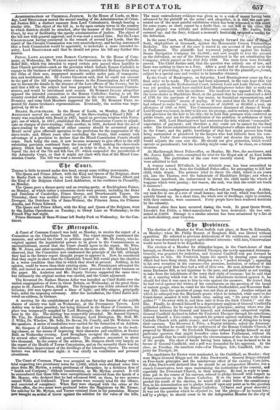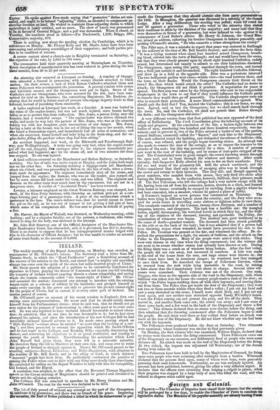Ebt iprobinres.
The election of a Member for West Suffolk took place, at Bury St. Edmund's, on Monday; when Mr. Philip Bennet, of Roughiun Hall, was elected without opposition. He referred to previous declarations of his sentiments, and averred that he was determined to support agricultural interests with him, Conservatism would never be found to be Expediency.
The election of a Member for Abingdon began, in the Court-house of that borough, on Monday; when Sir Frederick Thesiger, the newly-appointed Attorney General, was proposed for reelection, and General Caulfield was put forward in opposition to him. Sir Frederick began his speech by denying some charges which had been flung about, that Abingdon was.a pocket borough ; appealing to his own reception in his canvass—the promises, hesitation, or refusal of the electors—as proof that they had a will of their own. He next defended the Com- mons Enclosure Bill, as not injurious to the poor, and particularly as not tending to take from the inhabitants of the town their right of common; but he said that if, at a meeting which was to be held, the inhabitants declared against it, he should feel that it was open to him to vote against the measure. He denied that he had voted against the wishes of his constituents on the question of the broad or narrow gauge, when he voted for the Oxford, Staffordshire, and Worcester Rail- way Bill; since the question of gauge was not then at issue. Another subject on which he enlarged was the Maynooth grant; which he defended, while some in the Court-house assailed it with hostile cries, calling out, "Do away with it alto- gether!" " Do away with it, and then take it from tbe Irish Church!" and the like. Finally, he devoted himself to a depreciatory analysis of General Caulfield's published address, for its vague declaration of principles; asking where was the difference between the General and himself, and demanding ca -twrical replies. General Caulfield declined to follow Sir Frederick Thesiger through his catechism; avowed himself a Free-trader, repeated his protest against endowing the Roman Catholic Church with public money, and advised the. people of Abingdon to keep their common. The Reverend E. Price, a Baptist minister, asked the Attorney- General, whether he would vote for endowment of the Hamlin Catholic Church, if proposed by Ministei 3 ? Sir Frederick Thesiger refused to pledge himself on any particular question that might hereafter come before Parliament, without it being possible that he could anticipate the circumstances of the time or the wishes of the people. The show of hands having been taken, it With declared to be in favour of General Caulfield; soda poll was demanded for his opponent. At the close, on Tuesday, the numbers were—For Thesiger, 156; Caulfield, 126; ma- jority for Thesiger, 30.
The candidates for Exeter were nominated, in the Guildhall, on Monday: they were Major-General Briggs and Sir John Duckworth. General Briggs enlarged on Free-trade principles and the mischievous effect of the existing Corn-laws. Sir John Duckworth declared that he should be an independent Member, but a stanch Conservative, bent aeon maintaining. the institutions of the country, and especially the Protestant Church, in their integrity. He bad, in reply to ques- tions put in the course of his canvass, refused to pledge himself with respect to future concessions to the Roman Catholics. If on the issue of his refusal de- pended the result of the election, he would still stand before the constituency firm in his determination not to pledge himself upon any point as to the question of further concessions to the Roman Catholics. (Cheers and great disorder.) It was not the question which he objected to but the pledge—if he bound him-, self by a pledge, he should cease to be the independent Member for the city of
Exeter. He spoke against Free-trade saying that " protective" duties are mis- called, and ought to be termed "adjusting" duties, as Intended to compensate pe- cuculiar burdens on land. He wished to maintain those adjusting dirties to which agriculture is justly entitled,. and no more. The show of hands was pronounced to be in favour of General Bnggs; and a poll was demanded. When it closed, on Tuesday, the numbers stood' as follows—For Duckworth, 1,258; Briggs, 588; Conservative majority, 670.
There is nothing new about the pending election for Cambridge, which is to commence on Monday. Mr. Fitzroy Kelly and Mr. Shafto Adair have been busy canvassing and addressing assemblages of their supporters; and both parties pro- fess to be confident of success.
A severe contest about a church-rate in Keighley terminated on Saturday, in the rejection of the rate, by 1,063 to 794 votes. The iromnasters held their quarterly meeting at Birmingham on Thursday. Every description of manufactured iron has been reduced in price during the last three months, from 20 to 25 per cent.
An alarming riot occurred at Liverpool on Sunday. A number of Orange- men attended a funeral in procession, with orange ribands attached to black sashes. On their return, a mob of Irish Roman Catholics attacked them and seme Policemen who accompanied the procession. A general combat with stones and brickbats ensued, and the Orangemen were put to flight. Seven of the Catholics and one Orangeman, who were arrested for the riot, have been com- mitted for trial at the Sessions; the committing Magistrate, Mr. Rushton, de- claring that be would in future send all persons who engage in party-feuds to that tribunal, instead of punishing them summarily.
A boiler exploded at Liverpool last week, at a foundry. A man was buried in the ruins of the engine-house; but was not much injured, some beams having fallen so as to protect him from suffocation. Mrs. Jones, a person living near the foundry, had a wonderful escape. "The engine-boiler was driven through two walls, and made its way into the parlour of Mrs. Jones, who was at the moment taking tea with her daughter, quite unconscious of any danger. Mrs. Jones, having a baby at the breast, was in the act of lifting the cup to her month, when she heard a tremendous report, and immediately lost all sense of animation; and when she recovered, found herself and baby lying in the front-shop, and the en- gine-boilerfilling the parlour where they had been sitting."
An accident happened, last week, on the Ellsworth and Peterborough Rail- way, near Wellingborough. A train was going very fast, when the engine-tender got off the rail, dragging fice carriages after it: the engineer immediately per- ceived what bad happeneckanl let the steam off; and in two minutes the train was stopped. No one was injured.
A fatal collision occurred on the Manchester and Bolton Railway, on Saturday morning. One line of rails was under repair at Bingley, and the trains both ways ran on the other line. On Saturday Morning a luggage-train left Manchester about six o'clock, and was proceeding to Bolton on the line of rails, when a down- train made its appearance. The engineer immediately shut off his steam, and jumped from the engine; the fireman, who was on the tender, also jumped off, but by some means fell back under the train, and was killed. The engineer and fireman on the other train were much hurt by the concussion, but are not in a dangerous state. A verdict of "Accidental Death" has been returned.
Lovejoy, a labourer employed on the Great Western Railway, was charged, last week, at the Eton Potty Sessions, with throwing an earthen pint-pot at a.car- riage forming part of a passenger-train. A piece of the earthenware struck a passenger in the face. The man's defence was, that he merely meant to throw the pot on the rail, as he was out of temper at not getting a full pint of beer, which some of his companions did. He was sent to prison in default of paying a fine.
Mr. Harvey, the Mayor of Walsall, was drowned, on Wednesday morning, while bathing; and by a singular fatality, one of the persons, a tradesman, who volun- teered to drag for the body, was drowned in the attempt.
Mr. John Holt Stanway, one of the Official Assignees of the Manchester Dis- trict Bankruptcy Court, has absconded; and, it is presumed, has fled to America. There is no reason to suppose that he has misappropriated monies lodged with biro in his character of Official Assignee; but he was unable to render an account of some trust-funds, to the amount of 6,000L



























 Previous page
Previous page